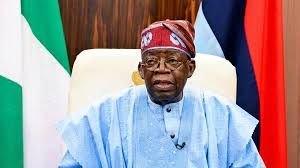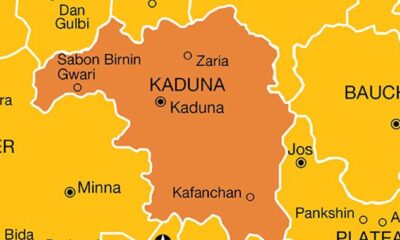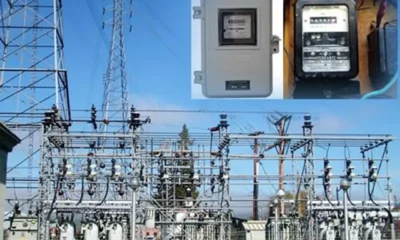Business
15% import tariff could make Nigeria fuel-producing powerhouse – Refiners

Nigeria’s petrol importation is projected to decline by as much as 80 per cent following the implementation of the 15 per cent import tariff on refined petroleum products, the Crude Oil Refiners Association of Nigeria has said.
Speaking in an interview with The PUNCH on Wednesday, CORAN’s Publicity Secretary, Eche Idoko, said the tariff, alongside other government reforms, was already triggering a major turnaround in the downstream petroleum market and easing pressure on the foreign exchange market.
Idoko commended President Bola Tinubu and his economic team for implementing bold reforms in the oil and gas sector, beginning with the removal of fuel subsidy, the adoption of the naira-for-crude policy, and now the introduction of the 15 per cent import duty.
He said the combination of these reforms was gradually transforming Nigeria into a refining hub for West Africa, adding that the country was beginning to retain its oil earnings rather than spending them abroad on imported fuel.
Idoko said, “Yes, and like I said in one of my interviews recently, I must commend the courage of the President and the economic team in taking some of the bold steps in terms of the reforms they have started.
“In the oil and gas sector, especially in the midstream, and starting with the removal of subsidy, and then followed by the naira-for-crude, we now have the implementation of the 15 per cent tariff on imported petrol.
“With the introduction of the 15 per cent import tariff, the importation of refined petroleum products, particularly petrol and diesel, has dropped by almost 80 per cent.”
He explained that the sharp decline in import volumes post-subsidy removal era had translated into a reduced demand for foreign exchange, resulting in gradual convergence between the parallel and official market exchange rates.
“The combined effect of this is going to make Nigeria a major refining hub, and then also try to retain our earnings as a country within the shores of the country. What this means is that we would now be spending what we earn within the country.
“Before now, the importation of petroleum alone accounted for almost 30 per cent of our foreign exchange. With this now, you will see that there has been a rapid drop in demand for effects, such that now the parallel market and the official market are almost converging,” he added.
Idoko noted that local refiners, including the Dangote Petroleum Refinery and modular plants such as Aradel Holdings, were ramping up production to meet domestic demand and bridge the supply gap created by the import tariff.
He said Aradel was nearing completion of a new hydro-skimming plant that would inject about 10,000 barrels of petrol daily into the market, while Dangote Refinery had already become a major supplier of aviation fuel and diesel both locally and across Europe.
Idoko also disclosed that CORAN had submitted a memorandum to the National Assembly proposing the creation of a Midstream and Downstream Development Fund to finance pipelines, jetties, and other infrastructure around refinery clusters.
The fund, he said, would operate like the existing Nigeria Gas Infrastructure Fund, offering soft loans and grants to operators to accelerate investment in the refining value chain.
“The sheer fact that we have fewer cargoes coming in, in terms of PMS, all just translates to a reduction in demand for effects. We also hope that with this now, we will see further reductions, to near zero, in terms of importation of AGO. Which, by the way, we have abundant capacity.
“In the area of AGO, we should be looking at backward integration now. We will begin to actually export more than import AGO. In terms of PMS, Dangote Refinery has repeatedly said that they have enough capacity in the country to meet our needs.
“We also know that some of the other refineries that have been waiting in the wings, this will only encourage them to boost the process of completing their PMS lines. For instance, Aradel. Aradel is already working on its hydro-steaming plant that is supposed to inject about 10,000 barrels a day of PMS into the stream.
“Things like this will encourage them. We have also, for major bulk breeders and major marketers, had a conversation with them in recent times. We also mentioned this at the National Assembly when we presented our memorandum.
“We should start talking with refinery owners more, and then the government, with the mind of preparing themselves for what they call forward integration, where we’ll convert their facilities from an import holding facility to an export holding facility,” he said.
The CORAN spokesman stressed that with improved capacity and policy consistency, Nigeria could transition from a net importer to an exporter of refined products to neighbouring African countries within a few years.
While commending the tariff policy, Idoko urged the Federal Government to complement it with measures that ensure a steady and affordable crude oil supply to local refineries.
He said refinery owners should be granted fair and transparent pricing similar to what is offered to international buyers, adding that the success of the tariff policy depends on the availability of feedstock at reasonable rates.
“A 10,000-barrel-per-day refinery should get 10,000 barrels of crude, while a 650,000-barrel plant like Dangote’s should receive its full allocation,” he said. “What we are asking for is not subsidy but fairness in pricing and access.”
However, Idoko cautioned that without complementary policies, the 15 per cent tariff could have unintended consequences, such as higher pump prices and temporary supply tightness.
“The tariff must not be implemented in isolation,” he warned. “If refineries don’t have access to crude and financing, it will only make imported fuel more expensive without boosting local supply, just like what happened after the subsidy removal.”
He urged the government to adopt a holistic implementation strategy that balances trade protection with production incentives, saying this was the only way to ensure energy security and stable fuel prices for Nigerians.
Nigeria has relied heavily on imported refined petroleum products for decades despite being Africa’s largest oil producer. The country’s four state-owned refineries with a combined capacity of 445,000 barrels per day have remained largely non-functional for years due to poor maintenance.
In recent months, the Federal Government has intensified efforts to revive domestic refining capacity through private-sector participation. The commissioning of the 650,000-barrel-per-day Dangote Refinery and the operation of several modular plants have raised hopes of ending Nigeria’s dependence on imported petrol.
The 15 per cent import tariff, approved last week, is part of President Bola Tinubu’s broader energy sector reforms aimed at promoting local production, conserving foreign exchange, and strengthening the value of the Naira.
Experts believe that if current reforms are sustained, Nigeria could achieve near-total self-sufficiency in refined petroleum products by 2026.
Idoko added that the long-term goal was for Nigeria to not only achieve self-sufficiency but also become a major exporter of refined petroleum products within the African continent under the African Continental Free Trade Area framework.
“We are seeing the first tangible results. With stable crude supply and fair policies, Nigeria won’t just stop importing petrol; we will soon start exporting to other African countries,” he concluded.
President Bola Tinubu’s approval of a 15 per cent import policy on PMS and diesel has stirred widespread concern across the oil and gas sector, with operators warning it could raise petrol prices, worsen inflation, and increase import costs, even as the government insists the policy aims to boost local refining and generate revenue.
The President’s approval was conveyed in a letter signed by his Private Secretary, Damilotun Aderemi, following a proposal submitted by the Executive Chairman of the Federal Inland Revenue Service, Zacch Adedeji.
The proposal sought the application of a 15 per cent duty on the cost, insurance, and freight value of imported petrol and diesel to align import costs with domestic market realities.
Billionaire businessman, Femi Otedola, also applauded Tinubu over the implementation of a 15 per cent import tariff on petrol and diesel, saying the move will protect investments in Nigeria’s refining and energy value chain.
He described the tariff policy as “a crucial move” that would prevent the Nigerian industrial sector from being undermined by cheaper imports.
“I commend President Bola Ahmed Tinubu for his bold and decisive step in implementing a 15 per cent import tariff on petrol and diesel.
“This policy represents a crucial move towards safeguarding local industries that have made substantial investments in domestic production and refining capacity,” he wrote in an advertorial.
“For decades, Nigeria’s industrial base has suffered from the unchecked importation of cheaper and often substandard goods, a practice that crippled once-thriving sectors such as textiles, local vehicle assembly, and manufacturing. We cannot afford to allow history to repeat itself within the energy sector, particularly now that Nigeria possesses the capacity to meet its petrol and diesel requirements locally.
“This tariff not only protects the billions of dollars already invested in refining infrastructure but also underscores the government’s commitment to driving industrialisation, creating employment, and building a sustainable energy future for our nation. This policy will also help establish a stable and sustainable pricing regime, contributing to greater control of inflation and long-term economic stability,” he stated.(Punch)
-

 News16 hours ago
News16 hours agoTinubu’s ambassador-designates in limbo
-

 Business16 hours ago
Business16 hours agoCBN raises alarm over Nigeria fintech’s foreign reliance
-

 Politics16 hours ago
Politics16 hours agoWe’ve no plans to impeach dep gov — Kano Assembly
-

 Opinion16 hours ago
Opinion16 hours agoLeft behind but not forgotten
-

 Politics16 hours ago
Politics16 hours agoWe Don’t Need Gov’s Support To Deliver Rivers For Tinubu – Wike
-

 Politics16 hours ago
Politics16 hours agoElectoral Act: Amendment yet to be concluded – Akpabio tells critics
-

 News16 hours ago
News16 hours agoKaduna Residents Protest Displacement Of 18 Villages By Bandits, Closure Of 13 Basic Schools
-

 News16 hours ago
News16 hours agoN7 Trillion, Four Presidents, Nigeria Still In Darkness


















